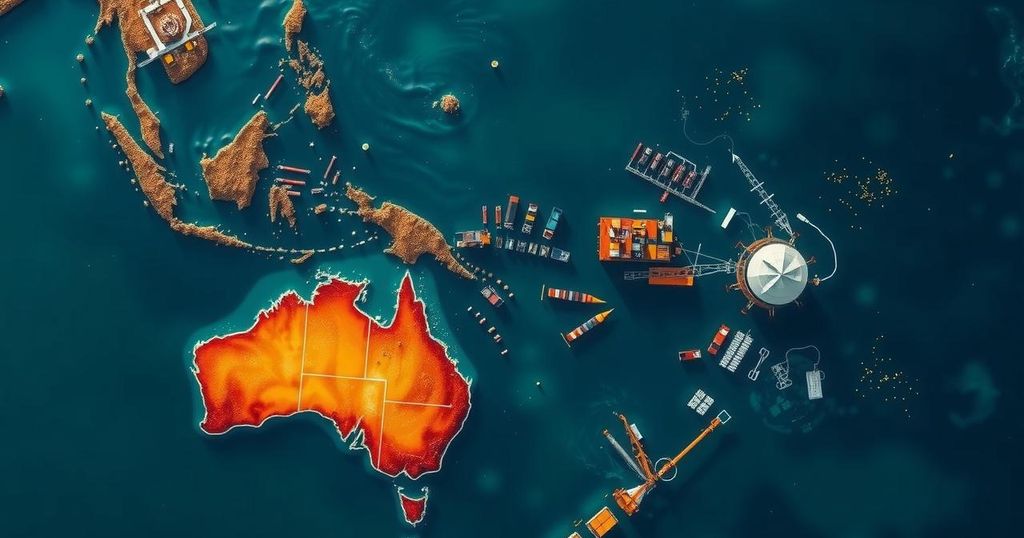Australia is torn between its role as a trusted partner to Pacific nations and its reliance on fossil fuel exports. Recently, it chose to emphasize fossil fuels over climate commitments in a legal case at the International Court of Justice initiated by Vanuatu and other Pacific nations. The outcome could redefine state responsibilities related to climate change while impacting Australia’s international relationships and future policies.
Australia has found itself at a crossroads, attempting to balance its role as a reliable partner to Pacific nations against its standing as a leading exporter of fossil fuels. This delicate situation has intensified as climate change emerges as an existential challenge for the region. Recently, in a decisive moment, Australia’s government opted to prioritize its fossil fuel interests over environmental responsibilities, provoking disappointment among Pacific nations striving for climate justice.
Vanuatu, alongside other Pacific nations, has taken legal action at the International Court of Justice (ICJ) to clarify the responsibilities of nations in safeguarding the climate for present and future generations. Unlike typical climate negotiations, this case is under public scrutiny, revealing Australia’s stance as it aligns with major fossil fuel emitters such as Saudi Arabia, the United States, and China, thereby minimizing its accountability for climate impacts.
This case marks a significant chapter in a five-year campaign that began with law students in Vanuatu. Their efforts culminated in a UN resolution in 2023 that requires the ICJ to provide an advisory opinion on the legal obligations of states concerning greenhouse gas emissions and their consequences for states causing substantial climate harm. Following a record number of submissions and two weeks of oral hearings, the ICJ’s opinion is anticipated to redefine international climate law despite its advisory nature, influencing future national cases and discussions in UN climate summits.
Australia’s current strategy shows no intent to decrease fossil fuel exports, addressing potential rulings with substantial implications. Given that emissions from Australia’s fossil fuel exports have surpassed those from its domestic use, there is concern about the broader environmental repercussions. During the court proceedings, Australian representatives acknowledged the initiative led by Vanuatu while arguing that obligations under the Paris Agreement should govern climate mitigation and that emissions differ fundamentally from environmental harm caused by toxic waste, complicating accountability.
The implications of this case could strain Australia’s relationships with Pacific nations, particularly as the impending ICJ opinion could validate shifting responsibilities regarding climate damages. The opinion, expected next year, may also influence Australia’s potential role as the host for COP31 in 2026, where the government could demonstrate a commitment to green exports instead of fossil fuels, reshaping its image as a partner of choice within the Pacific region.
The article discusses Australia’s dual role as a significant fossil fuel exporter and a partner to Pacific nations amid escalating climate concerns. It highlights the tension between economic interests in fossil fuels and the urgent need for climate action in the region, as evidenced by recent legal moves initiated by Pacific nations. The legal case at the International Court of Justice signifies a landmark moment for climate accountability, potentially reshaping the dialogue surrounding environmental law and state responsibilities versus corporate interests.
In conclusion, Australia’s decision to favor fossil fuel exports over its commitments to climate action poses significant challenges to its relationships with Pacific nations and may lead to accountability under international law. The forthcoming advisory opinion from the International Court of Justice is likely to set critical precedents that could reshape the legal obligations countries have regarding climate change and impact Australia’s future role in the global dialogue on climate action. This juncture presents an opportunity for Australia to reconsider its environmental policies and align its interests more closely with the aspirations of the Pacific nations.
Original Source: theconversation.com






